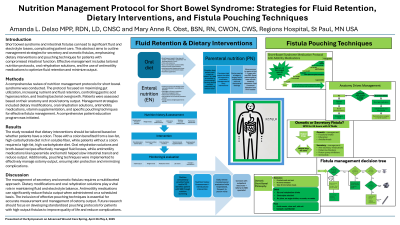Evidence-Based Practice
(EBP-013) Nutrition Management Protocol for Short Bowel Syndrome: Strategies for Fluid Retention, Dietary Interventions, and Fistula Pouching Techniques

Short bowel syndrome and intestinal fistulas can lead to significant fluid and electrolyte losses, complicating patient care. This abstract aims to outline management strategies for secretory and osmotic fistulas, emphasizing dietary interventions and pouching techniques for patients with compromised intestinal function. Effective management includes tailored nutrition protocols, oral rehydration solutions, and the use of antimotility medications to optimize fluid retention and minimize output.
Methods:
A comprehensive review of nutrition management protocols for short bowel syndrome was conducted. The protocol focused on maximizing gut utilization, increasing nutrient and fluid retention, controlling gastric acid hypersecretion, and treating bacterial overgrowth. Patients were assessed based on their anatomy and stool/ostomy output. Management strategies included dietary modifications, oral rehydration solutions, antimotility medications, vitamin supplementation, and specific pouching techniques for effective fistula management. A comprehensive patient education program was initiated. The study revealed that dietary interventions should be tailored based on whether patients have a colon. Those with a colon benefited from a low-fat, high-carbohydrate diet rich in soluble fiber, while patients without a colon required a high-fat, high-carbohydrate diet. Oral rehydration solutions and broth-based recipes effectively managed fluid losses, while antimotility medications like loperamide and lomotil helped slow intestinal transit and reduce output. Additionally, pouching techniques were implemented to effectively manage ostomy output, ensuring skin protection and minimizing complications.
Results:
Discussion:
The management of secretory and osmotic fistulas requires a multifaceted approach. Dietary modifications and oral rehydration solutions play a vital role in maintaining fluid and electrolyte balance. Antimotility medications can significantly reduce fistula output when administered on a scheduled basis. The inclusion of effective pouching techniques is essential for accurate measurement and management of ostomy output. Future research should focus on developing standardized pouching protocols for patients with high-output fistulas to improve quality of life and reduce complications.

.jpg)